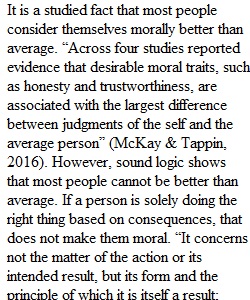


Q Watch: Ethical dilemma number nine: The Shopkeeper's Action Discuss: Is doing the right thing because of a fear of consequence a just action? All written material will be judged not only on content but style. Typos, grammatical and spelling errors, and dishonesty (plagiarism) will all count against the final grade assigned. To successfully participate in a discussion forum, students will need to post a minimum of three relevant postings to the discussion, over at least three different days of the week. To be considered relevant, the posting must move the discussion forward with new information, opinion or direction. Posting only “I agree” or “I disagree” is not considered relevant, and will not be considered a relevant post. It is of course permissible to agree or disagree with a fellow classmate – as long as defensible reasons for the new position are provided. No personal attacks or disruptive behavior will be tolerated in the discussion. I believe the discussion boards are very important - hence I count them as a large part of your final grade. You will find I am generous with extra credit for bar-raising participation. Participate at least three different times a week, raise the bar each time, reference the sources for your opinions and you will do well. Keep the conversation flowing!
View Related Questions